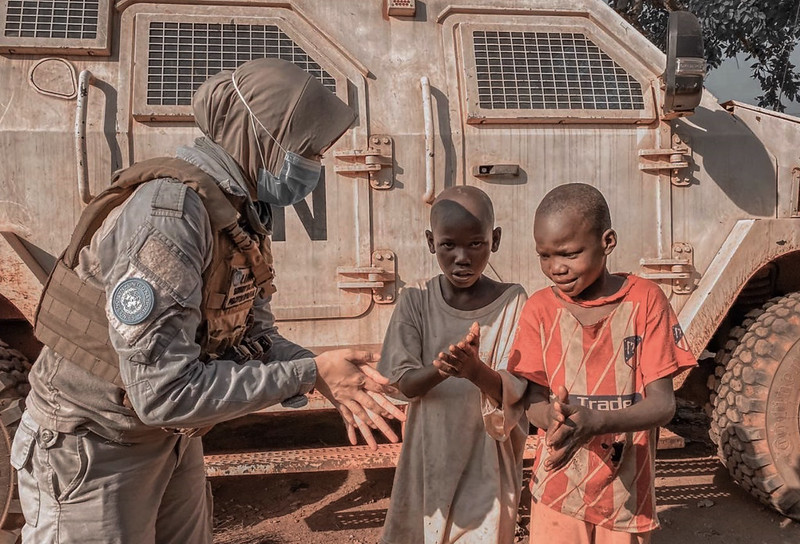 Women building peace during Covid-19 and beyond
Women building peace during Covid-19 and beyond
A new
report by the Center for Strategic and International Studies looks at the role of women peacebuilders and peacekeepers in educating local communities on responding to and recovering from the Covid-19 pandemic. The report examined countries such as Afghanistan, Ethiopia, Liberia, Sri Lanka, Syria and Tanzania and found that women peacebuilders are beneficial because they can reach all parts of the communities they are deployed to, something noted in a 2019 UN Security Council
debate.
The report offered several recommendations for the US and its allies to enhance the role of women peacebuilders. These include providing longer term funding for women’s organisations, increasing women’s leadership across all areas of society, identifying priority countries for targeted WPS support and adopting a gender lens for all Covid-19 responses.
Women and the Afghan peace process
Writing for
Foreign Policy, Afghanistan’s ambassador to the United States, Roya Rahmani,
argues women should be at the centre of the Afghan peace process, stating, ‘Peace cannot be established by an agreement just between those who hold the guns.’ Rahmani highlights how substantial and meaningful inclusion of women in peace processes makes peace agreements more likely to succeed and endure. She points to how Afghan women with strong community and civil-society links have helped to reintegrate combatants, facilitate
peace talks, enable hostage releases and implement counter-extremism programs.
The ambassador concludes her piece by advocating the continued emergence of
Afghan women in all aspects of the country’s society and constitutionally enshrined rights and protections for women.
LGBTQI+ intersectionality in the WPS agenda
Understanding the intersection between LGBTQI+ identity and gender expression is playing an increasingly integral role in progressing the WPS agenda. OutRight Action International has released a
report detailing how gender identity and sexual orientation can put some individuals at greater risk in conflict scenarios. The report argues for a more inclusive understanding of the WPS agenda.
A salient example of the importance of including queer perspectives in the WPS agenda is that of Poland. A
piece in the London School of Economics blog explores how LGBTQI+ discrimination in the country has hindered its fulfilment of WPS goals. In 2015–16, more than
70% of the Polish LGBTQI+ community experienced some form of violence, only 4% of which was reported to authorities. In particular, violence against lesbian, bisexual, transgender and intersex women illustrates that queer identity should be a core part of the WPS agenda.
As the 20-year anniversary of Security Council resolution 1325 approaches, it is more important than ever to recognise
the role of queer identity in the WPS agenda.
Responding to conflict-related sexual violence in Ukraine
Conflict-related sexual violence in Ukraine is the topic of Kateryna Busol’s expert comment for Chatham House.
Busol examines how both women and men are subjected to sexual violence and the challenges of formulating sound policy responses to the problem. Weaknesses in Ukraine’s legislation and criminal justice system are hindering the provision of appropriate assistance for victims.
Investigation of conflict-related sexual violence is also made difficult by the
stigma surrounding it. Incidents often go unreported by women wanting to avoid retraumatisation and by men suppressing the perceived ‘shame’ of being subject to such violence.
Busol argues that more action is required and, above all, a gender-based approach that incorporates meaningful female participation in policymaking is needed to successfully address conflict-related sexual violence.
Feminism and Australian foreign policy
The term ‘feminist’
is still misunderstood by many Australians and because of this politicians are unlikely to ‘adopt an explicitly feminist foreign policy’ anytime soon, according to the University of Melbourne’s Grant Wyeth. Countries such as Canada,
Sweden and Mexico have adopted feminist foreign policies, acknowledging that they gendered perspectives help to ensure outcomes like inclusive peace and economic growth, nuanced responses to conflict and climate change—which disproportionately impact women and girls—and effective responses to intersectional inequalities.
Australia hasn’t yet decided to frame its foreign policy in this manner although, as Wyeth argues, many of the same ‘lessons of a female-centric approach to international relations’ are being applied. Despite some progress, this hasn’t translated into coordinated action, especially on the domestic front, where rates of
femicide and
domestic violence remain high.
Supporting women in South Africa’s informal economy
The Covid-19 pandemic has
exacerbated financial and social difficulties for women working in informal employment arrangements in South Africa. Women in the
informal economy often earn lower wages, lack job security and are more vulnerable to poverty and food insecurity.
Between February and April, South African women working in informal employment experienced a 49% decrease in working hours, while men saw a 25% decrease over the same period. Writing in
The Conversation, Mike Rogan and Caroline Skinner argue that measures including a universal basic income, increases in child support and unemployment payments, and accessible loans for small businesses are needed to support these women.
 Print This Post
Print This Post